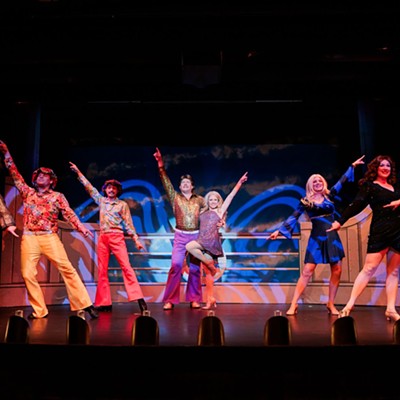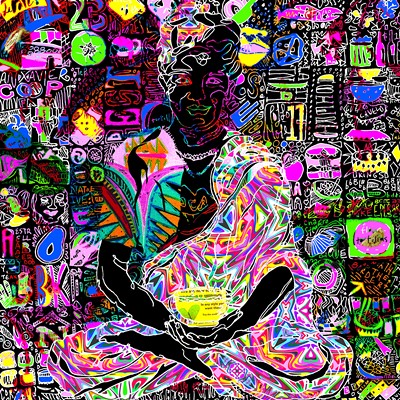Melissa James Gibson was a 30-something playwright when she wrote [sic], the play now on the boards at Live Theatre Workshop. She doesn't pretend, as far as I know, to speak for Generation X. But if she does, and her plays do seem to find themes and conventions that might give that demographic's denizens a voice, it's a weird, stunted and even reluctant one. Although [sic] furnishes the stage with an unusual and imaginative set-up and a theatrical style that gives us lots of laughs, those laughs come at the expense of odd characters that we sort of grow fond of. And when all is said and done, we're left—if we're left anything at all—with a sense of unease, if not downright sadness.
Theo (Steve Wood), Frank (Matthew C. Copley) and Babette (Samantha Cormier) are next-door neighbors in what seems an apartment building for those who can manage low rent, if they can manage rent at all. They are squeezed into adjacent studios, which seem as claustrophobic as a chilly compartment in the morgue. Theo, eager and almost just a big-but-serious kid, has "lost" his wife and now labors to compose themes for amusement park rides. Frank, who—for a gay guy—has atrocious tastes in clothes, has assumed his ex-lover's apartment, and, at odds with ambition, has landed upon a chance to pursue a career in auctioneering. Babette is a writer, unpublished but about to be, she is sure. In the meantime, her occupation is borrowing money from anyone foolish enough to lend it.
Their unfolding stories, which actually focus on how they relate to each other, and also how, as a sort of hobbled monolith, they relate to others, provides the path of the play. It is the stuff of their lives, but it really feels like a veneer of lives. Gibson does allow a bit of depth, or conflict, as they reveal their history with each other and as they sometimes pair in what seems to the other as conspiracy. It's easy to feel left out and stand with an ear to the door. If the conspiracy seems too dangerous, one will bolt out the door, disallowing what might or might not be a substantive interaction. All of this is grounded in a style that delivers a comic tone, and the actors make it totally believable, and that, of course, makes it even more funny.
These characters are funny losers, but they are losers nonetheless, stunted, wrapped up in their own peculiar interests, which are laughably sad, and their dependence on each other for friendship, which is warped and formless. What form there might be makes for a funny play, but a disturbing one as well.
Perhaps the problem is a lack of clarity with Gibson's intention. A playwright might start writing a play with a less than clear purpose; writers often do. The process might create resonances that quite surprise the writer and lead to what seem like delightful discoveries. But if a writer has not clarified to herself whether or not those surprises belong within the beast she's creating with all the tools drama school has taught her, she can end up with a really messy product.
But that's an interesting thing about [sic]. It's not really messy. It's specific in its setting and Gibson certainly doesn't let her characters loose to act without restraint. Her language and turns of phrase are intentionally funny. Laugh out loud worthy, even. Director Maryann Green and her actors have that down, and that's no small feat. Assisted by Glen Bucy's wonderfully clever set and Michael Martinez' terrific sound design, you don't get the quite tidy play we see here from a playwright without a firm grip on what works theatrically.
Now, playwrights can be brilliant con artists, and maybe Gibson is just that. Although she entertains us, she seems to want to offer more. But that "more" never really materializes. Or perhaps it's we who want more, and feel like we've been primed to expect it. But we are unsatisfied, like we've been dropped off at the bus stop without a clue about where we're going or if our bus pass is current. We smirked with delight when the idea of this scenario was presented to us; we're game—oh, this is going to be interesting. I'll meet interesting characters and strike up some bizarre conversations. It'll be fun. But a couple of hours later, when the bus still hasn't arrived to take us somewhere, another location that we are pretty sure would offer some sort of pay-off, we tire of the exercise and wonder, has this been fun at all?
Well, maybe. But in an odd, thin way.
Even the title of the plays seems to suggest something of import. The term refers to a grammatical issue that addresses quoting someone that has misused or misspelled a word. You keep the misspelling or whatever it might be, but you use [sic] indicating that you have done exactly that and that you were not the one that made the error. Hmm. Okay. Oh, could there be an intentional link to the word "sick?" Well ... maybe. Sic is Latin for "thus," so is it a bit curious that Gibson has written another play entitled This?
In her notes in the program, director Green describes [sic] as "a post-modern Waiting For Godot with all the intricate wordplay of a Shakespeare play, set against the backdrop of something you might find on Netflix." I guess that describes it pretty well and really doesn't undermine at all what we're wrestling with here.
Does Gibson lead us to a cathartic moment? Maybe. In the final moments, the characters are sitting outside of their building—the only time we see them outside. As they chat in their sparse way, someone sneezes and the others offer a "Gesundheit." Is this the sum of our post-modern relationships?
Ha-ha-ha-ha-ha-
Oh?








